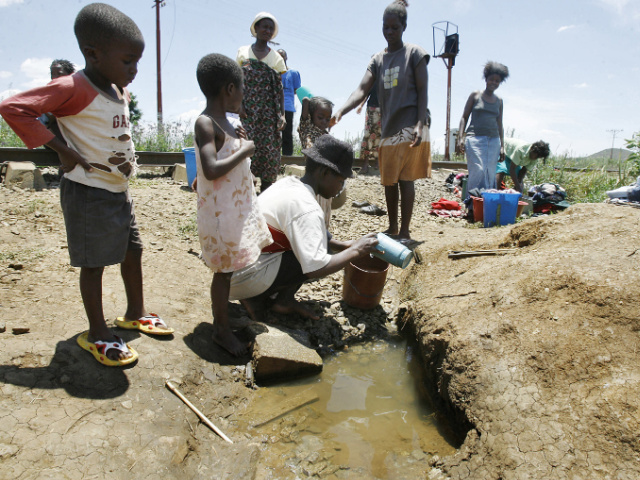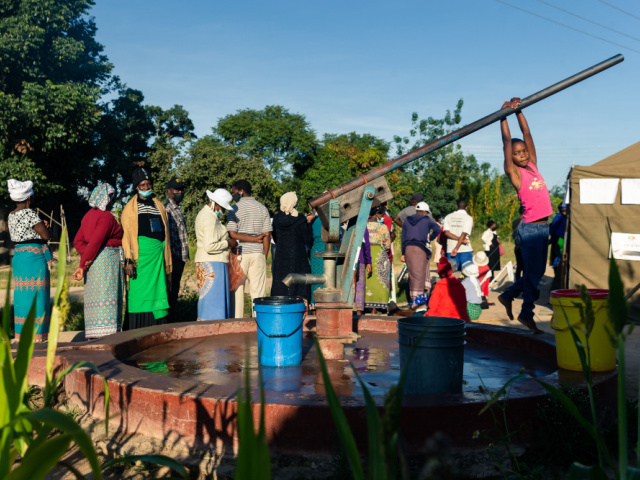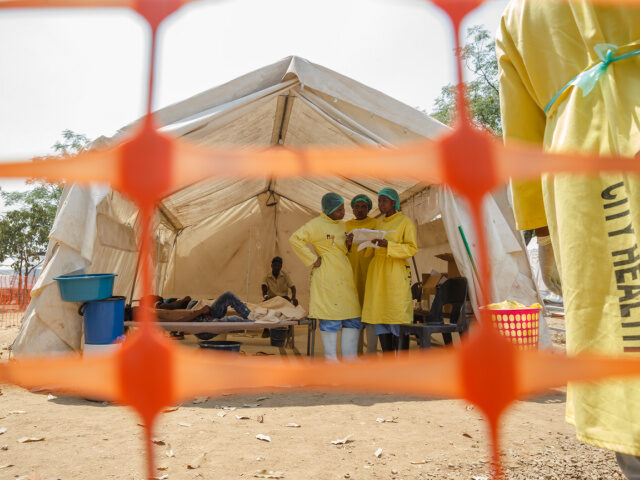The socialist government of Zimbabwe on Sunday announced emergency measures to contain a fast-growing epidemic of cholera that has spread to every province in the country.
Restrictions include a ban on large gatherings, a ban on shaking hands, and a limit of 50 people at funerals. Funeral services were also ordered to stop serving food.
Al Jazeera explained that cholera spreads quickly through contaminated food and water. Zimbabwe has notoriously “poor sanitation infrastructure” and “limited clean water,” especially in rural areas, where residents often use water from unsafe wells and rivers polluted by sewage.

Zimbabwean women and children fetch water from an unprotected well on November 26, 2008, in Harare. At that time, at least 300 people had died of cholera across the country since the first outbreak nearly two months prior (DESMOND KWANDE/AFP via Getty Images).
Zimbabwe’s capital city of Harare instructed residents not to purchase food from unlicensed vendors. Port officials said they would intensify screening efforts to keep infected supplies out of the country.
The highest concentration of cholera cases has been reported in Manicaland, a province that borders Mozambique. Officials in Manicaland and other heavily impacted provinces urged their citizens to stay away from open markets, church camps, and other social gatherings, and to step up their own personal hygiene.
“The cholera problem is not new. We’ve had it for a while but … There used to be health workers who would move around communities distributing water purification tablets that we could use to treat open wells. That isn’t happening anymore,” a resident of the cholera-wracked city of Buhera told Al Jazeera.
Another Zimbabwean said there are not enough “boreholes,” or narrow wells, to meet the clean water needs of large villages.
“We need more boreholes. We are getting cholera when we drink contaminated water from the rivers,” she said.

A girl goes about her early morning duties pumping water into a bucket at a community borehole in Zimbabwe, March 26, 2022 (JEKESAI NJIKIZANA/AFP via Getty Images).
Shallow wells in Zimbabwe have a tendency to hit water that has been contaminated by broken sewer pipes. Raw sewage can be smelled in the air of many towns, and food vendors are constantly battling swarms of flies.
“We are tired of this sewage, it bursts all the time. Our children are now getting sick. This has been going on for a long time,” a small-town Zimbabwean named Charles Manika told the UK Guardian last week.
“We are asking the council to fix this because we are not living like human beings. They do not live in areas infested with raw sewage themselves,” noted Manika’s friend Morehickson Manatse, a food vendor.
Human rights groups complain the water quality in Zimbabwe has been at crisis levels for years, with few improvements made after the last deadly cholera outbreak. In September 2021, Human Rights Watch (HRW) blamed the problem on “obsolete water infrastructure, a ballooning population, severe droughts, and pervasive government corruption and mismanagement.”
“Harare’s long unresolved water crisis is a ticking time bomb of magnified health risks that forces residents to seek alternative, often unsafe water sources,” HRW Southern Africa director Dewa Mavhinga warned.
The obsolete water infrastructure HRW referred to was designed and built in the 1950s. The designers anticipated about 300,000 residents in Harare, but the current population is about 4.5 million. The lethargic socialist government does very little to help poor residents obtain clean water, while the wealthy elites have access to safe wells and bottled water.
Doctors Without Borders (MSF) developed techniques for safely drilling and sealing boreholes in 2017 that virtually eliminated the risk of contamination, but the cost of several thousand dollars per well proved to be more than the government of President Emmerson Mnangagwa was willing to pay, even though the national government is constitutionally required to provide clean water for its people.
Zimbabwe is haunted by memories of a massive cholera epidemic in 2008 and 2009, which made almost 100,000 people sick and caused 4,000 deaths. The current outbreak has killed about 100 people out of 5,000 reported cases.
The World Health Organization (W.H.O.) on Monday warned that “cholera cases are again on the rise, even in countries that had not seen the disease in years.”
“While the triggers for cholera outbreaks – like poverty and conflict – are enduring, climate change and conflict are now compounding the problem. Extreme climate events like floods, cyclones and droughts reduce access to clean water and create an ideal environment for cholera to thrive,” W.H.O. said.


COMMENTS
Please let us know if you're having issues with commenting.